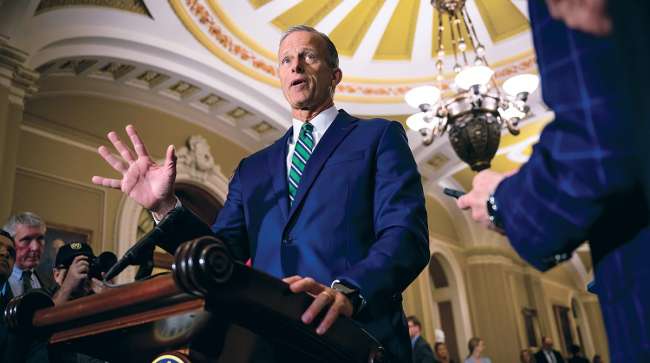Senate’s Action in Transportation During House Recess
With the U.S. House of Representatives in recess for the month of August, the Senate has been busy addressing crucial matters related to transportation policy and key leadership roles within the Department of Transportation (DOT). The discussion around these nominations is vital, as it can impact various aspects of logistics and transportation across the country.
Legislative Movements and Nominations
Majority Leader John Thune emphasized the Senate’s commitment to pushing forward several nominees and highway policy bills during this period. This proactive approach indicates a strong intent to manage fiscal 2026 funding bills and confirm nominations made by the president for critical positions in the department, which can significantly affect the logistics landscape.
“Numerous important positions remain unoccupied and need filling,” Thune noted recently. His assertion points to a pressing necessity for capable leaders in the DOT, which plays a pivotal role in overseeing transportation logistics at a national level.
Key Nominees Awaiting Confirmation
Among those waiting for confirmation are nominees such as Marc Molinaro, David Fink, and Sean McMaster, who are set to head the Federal Transit Administration, Federal Railroad Administration, and Federal Highway Administration, respectively. Each nominee brings a distinct vision aimed at enhancing the nation’s transportation efficiency, which is a cornerstone for effective logistics operations.
Improving Transportation Efficiency
During his hearing, nominee McMaster conveyed a clear commitment: “If confirmed, I look forward to working with the secretary and Congress on ways to improve efficiency and reduce costs.” Such initiatives are crucial, as they promise to ensure more taxpayer dollars are directed towards building and maintaining infrastructure. This focus on efficiency aligns perfectly with the needs of logistics services across diverse sectors.
Strategic Visions and the National Freight Plan
The nomination of Michael Rutherford as assistant secretary for the Office of Multimodal Freight Infrastructure and Policy is also significant. He aims to articulate a compelling vision for the National Freight Strategic Plan, ensuring that activities align with the broader goals of the administration while maximizing the effective use of taxpayer resources.
Rutherford stated his focus would be on “making the most of every taxpayer dollar,” which resonates deeply with the pressing need for budget-conscious logistics strategies in the current economic climate.
Safety and Reliability in Logistics
The Senate committee has also voted to approve Derek Barrs for the Federal Motor Carrier Safety Administration. Barrs has expressed his understanding of how the FMCSA’s actions influence the entire logistics industry. His approach aims at enhancing transparency and collaboration among government and industry stakeholders to improve roadway safety, which is vital for a thriving logistics environment.
Future Transportation Policies
Shifting gears, the Environment and Public Works Committee is also looking into multi-year legislation designed to update federal programs related to the nation’s mobility network. Enhancing safety for both industries and commuters is central to this legislative effort, with Chairwoman Shelley Moore Capito prioritizing investments aimed at minimizing operational overlaps. The emphasis on improving the reliability and safety of the surface transportation network could reshape logistics practices across various sectors.
Moreover, the ongoing discussions indicate the Senate’s readiness to tackle challenging subjects like the impact of climate change on transportation policies—a multifaceted issue that directly affects logistics operations and requires a balanced approach to ensure economic viability.
Staying Informed as the Recess Concludes
As Congress takes its summer recess officially starting in August, both chambers are set to reconvene after Labor Day. With a looming deadline for approving fiscal 2026 funding measures by September 30th, the pressure is on. The outcomes not only affect federal transportation funding but have a cascading effect on logistics and freight operations nationwide.
Understanding these legislative movements is essential for stakeholders in the logistics sector. Regardless of the complexities encountered, platforms such as GetTransport.com continue to adapt and offer comprehensive solutions for cargo transportation. By leveraging global networks and catering to diverse needs—from office relocations to bulky freight deliveries—GetTransport.com stands out as a reliable choice for all logistics solutions.
Recap of Legislative Developments
- Major focus on confirming DOT leadership during House recess.
- Initiatives to enhance efficiency in transport budgets and policies.
- Potential impacts on logistics practices stemming from safety and operational changes.
- Legislative updates on transportation measures before fiscal deadlines.
This article uncovers the ongoing debates and nominations within the Senate that carry significant implications for the logistics industry. The information presented highlights a crucial takeaway: even the best reports can’t replace the insights gained from direct experience. By partnering with trusted services like GetTransport.com, customers can access competitively priced cargo transportation options, making informed decisions paired with convenience and transparency in logistics. For a truly hassle-free experience, book your ride at GetTransport.com 今天!

 Senate Addresses Key Nominations at the Department of Transportation">
Senate Addresses Key Nominations at the Department of Transportation">